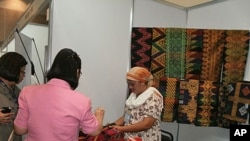Every day, 3,000 Philippine citizens leave home to work in another country. They are drawn by the higher pay, and their salaries provide a critical boost to the Philippine economy. Now, after years of encouraging workers to go abroad, the government is stepping up efforts to bring them home.
Paul Guevarra returned to the Philippines from Libya in March. He had been on assignment there for the past five years, earning close to $100,000 per year as a senior maintenance planner at a multinational oil company.
The 27-year-old says it was easy to work in a peaceful country. But he says things turned scary in February, when bloody clashes erupted on the streets.
"You know, we’re hearing bombs all over the place, we’re hearing people firing guns and we had the place secured. But the problem is you don’t know who are the 'pros' and who are the 'anti,'" he explained.
Although Guevarra enjoyed being back with his family in a province about two hours northeast of Manila, the father of two felt the strain of not having an income. Earlier this year, when he had nearly exhausted his savings, he learned that he qualified for a special $47,000 loan from the government. The lifelong musician is using it to open a music studio.
"Even when I was working abroad we were dreaming of this business," he said. But unfortunately no matter how much money I sent home, we cannot- 2,000,000 pesos, it’s quite difficult to save. So I’m so fortunate that the government launched this program. We’re so happy that we were part of this first 11 who were granted.”
Guevarra officially accepted the loan at an event in Manila to announce the release of new government-backed loans for returning overseas workers.
The program has existed for four years, but the government is now offering more money, at lower rates. Philippine Labor Secretary Linda Baldoz delivered a message from President Benigno Aquino during the event.
"A year ago I said we should move away from a government that treats its people as an export commodity and a means to earn foreign exchange, disregarding the social cost to every Filipino family, to a government that creates job[s] at home so that working abroad will be a choice rather than a necessity," he said.
The Aquino administration is trying to make working at home more attractive - not an easy task given the latest data. In 2009, the national census calculated the average family income was less than $400 per month. Overseas workers can earn much more, and last year sent home an estimated $20 billion. The government says that accounts for about 10 percent of the country’s gross domestic product.
At the conference, officials showcased the at-home businesses that are possible through the loan program.
In one booth, a customer haggles with Tahanie Mohammad Dalmaob over the price of tube skirts and dresses native to Muslim-majority Mindanao in the south.
Dalmaob worked as household help for seven years in the Middle East but she had little to show for her efforts, so she returned home 16 years ago. She says working abroad was difficult and she wanted to raise a family at home.
Dalmaob picked up her ancestral trade weaving the traditional dress known as "malong." The tube clothing is made now with modern materials of silky rayon with shimmery thread woven in geometric and plaid patterns. Weaving one piece takes three to five days. The materials, which come from Manila, cost a premium. Dalmaob says the work is profitable and helps sustain her family.
As a former overseas worker, Dalmaob qualified for a small loan two years ago that she says was a big help in paying her team of weavers. But she has major challenges because Cotabato City, where she can best sell her goods, is in a conflict zone. Muslim rebels there have been fighting the government for decades.
Dalmaob says she cannot force customers, who are constantly displaced by fighting, to buy the pricey clothing. She says they ask her what they would do with such fancy clothes.
She is hoping for another government loan to help her market her clothes, but is not sure if she will qualify. Despite the challenges, she says she still would not consider working overseas again.
She says you get to stay with your family and no matter what, you will always find a way for your family to survive.
Paul Guevarra started accepting clients to his newly sound-proofed music studio in late September. So far, his dream project is running smoothly, but he says the earnings from the studio are barely enough to pay the rent and household needs.
So Guevarra is moving forward with his fall-back plan. He says his former employer asked him to return to Libya after the company determined that security is stabilizing. He says he plans to go back while his musician brother and wife take care of the new business at home.
Despite the government incentives, his story is typical in the Philippines, where the labor department say 80 percent of all returning workers choose to go back abroad.
Loans Encourage Philippines Overseas Workers to Return Home
- By Simone Orendain








